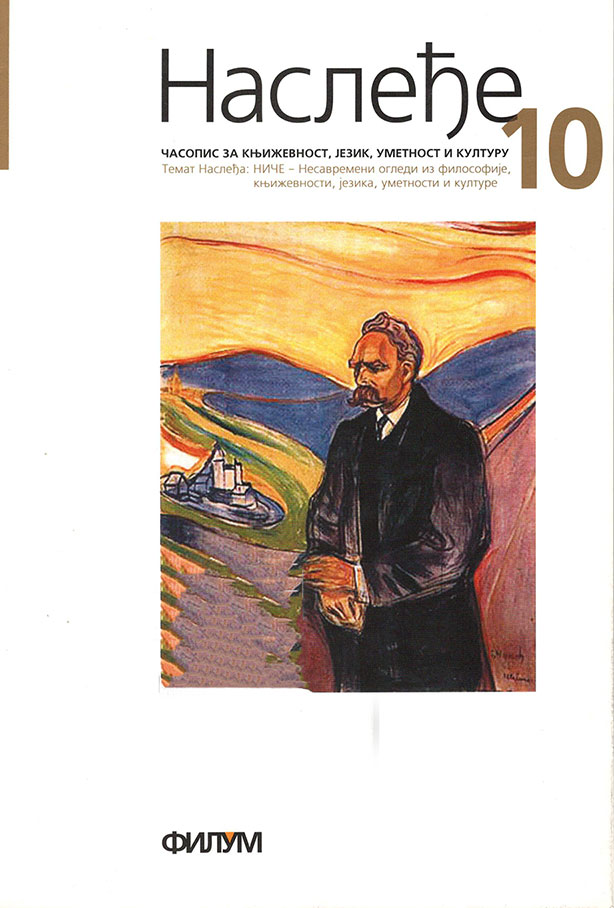PHILOSOPHY AND THE BODILY ARTS
Keywords:
Ниче, Клосовски, плес, филозофија тела, субјективитет покрета, кинестетичка сензибилностAbstract
This paper is an attempt to think through some of Nietzsche’s ideas about the body in relation to (post)modern dance. Following Nietzsche’s critique of consciousness, the paper looks at dance in relation to subjectivity but also aims to articulate a notion of dancing that lies outside any notion of lived subjectivity. Its argument is that there is a resonance between Nietzsche’s account of bodily becomings and the sorts of bodily activity found in (post)modern dance. This critique of movement subjectivity is developed through Nietzsche’s remarks about the artist’s taste, which he contrasts with the creative power of art itself. It also draws on Pierre Klossowski’s reading of Nietzsche’s work. The paper discusses a number of dance artists who critically engage their own dancerly subjectivity in an attempt to produce work that challenges their own movement givens.
References
Claire Colebrook пише: ‘Сам концепт субјекта је везан за стратегију бивствовања и суштине, пре него постајања’ Claire Colebrook, ‘A Grammar of Becoming: Strategy, Subjectivism and Style’, in Becomings: Explorations in Time, Memory and Futures, ed. Elizabeth
Grosz (Ithaca and London: Cornell University Press, 1999), 117–40 (p.117).
Maxine Sheets-Johnstone, The Phenomenology of Dance (London: Dance Books, 1966), 4.
Thomas Csordas, ‘Embodiment and Cultural Phenomenology’, in Perspectives on Embodiment:
The Intersections of Nature and Culture, ed. Gail Weiss and Honi Fern Haber (New York: Routledge, 1999), 143–162.
Thomas Csordas, ‘Somatic Modes of Attention’, Cultural Anthropology, 8 (1993), pp.135–56 (138).
Thomas Csordas, ‘Embodiment and Cultural Phenomenology’, 149.
Philipa Rothfield, ‘Differentiating Phenomenology and Dance’, 48. Vidi i: David Hoy, ‘Critical
Resistance: Foucault and Bourdieu’, in Perspectives on Embodiment: The Intersections of Nature and Culture, ed. Gail Weiss and Honi Fern Haber (New York: Routledge, 1999), 3–21.
Friedrich Nietzsche, On the Genealogy of Morality [1887], ed. Keith Ansell-Pearson, trans. Carol Diethe (Cambridge: Cambridge University Press, 1994).
Friedrich Nietzsche, Will to Power, ed. Walter Kaufmann, trans. Walter Kaufmann and R.J. Hollingdale, (New York: Vintage, 1968), §291.
Friedrich Nietzsche, ‘On Truth and Lie in an Extra-Moral Sense’ [1873], u The Portable Nietzsche, ed. and trans. Walter Kaufman (Harmondsworth: Penguin, 1968), 42–50 (44). Friedrich Nietzsche, The Gay Science, §372.
Pierre Klossowski, Nietzsche and the Vicious Circle [1969], trans. Daniel Smith (London: Continuum, 2005), 20.
Friedrich Nietzsche, The Birth of Tragedy: Out of the Spirit of Music, ed. Michael Tanner, trans. Shaun Whiteside (London: Penguin, 1993).






